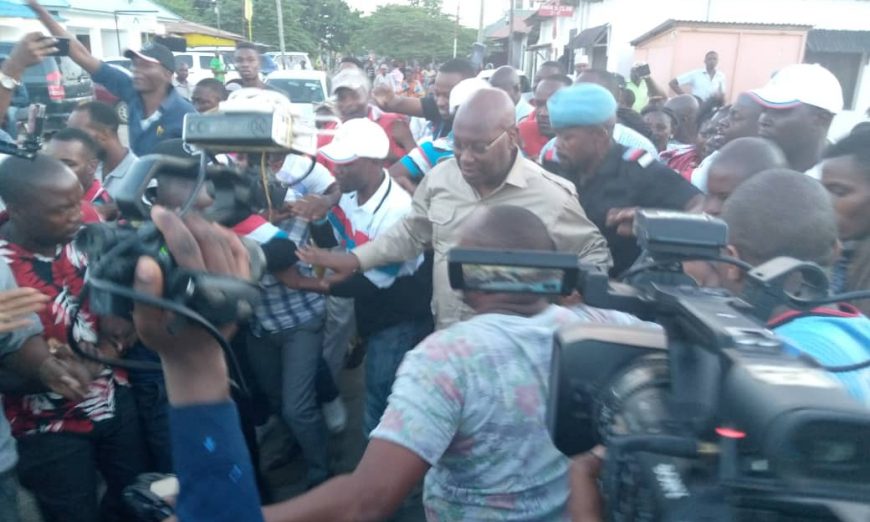FOLLOWING the Resident Magistrate’s court ruling that convicted eight top opposition politicians on Tuesday this week in Tanzania, the pressure is mounting and public resistance is rampant.
This time, people did not demonstrate by marching on the streets but they showed their grievances and opposition to the country’s fascistic regime by making monetary donations to pay the hefty fines ($150,000) imposed on the opposition leaders. It was a protest against an unjust court ruling that seeks to criminalise political rallies and demonstrations.
The International Democratic Union is not happy, and the US Bureau of African Affairs has called on Tanzania to back up her “promises on free and fair elections with actions that concretely protect democratic and human rights.” And the US has documented Tanzania’s human rights records.
The people’s message is obviously loud and clear against the regime that did not expect the convicted opposition leaders to be able to pay the fines. The regime’s motive was to keep the opposition in prison and deny them an opportunity to prepare for the October 2020 general elections – which the ruling party has vowed to win by using the repressive state apparatus.
But if you have not been following the events, or if you didn’t get the proper meaning of these episodes, you may still get it in simple terms from Fatma Karume, an advocate of the High Court of Tanzania, a former president of the Tanganyika Law Society (TLS), and a daughter to former Zanzibar President Amani Karume. Through eleven tweets, she narrates what she calls: “A Positive African Story of an ongoing battle against dictatorship.”
To send the message home, SAUTI KUBWA proudly quotes and shares the narrative as follows:

“I want to tell a positive African story of an ongoing battle against dictatorship.”
“On 10th March 2020, the Magufuli regime in Tanzania sentences the entire top leadership of CHADEMA, the main opposition party, to a total of USD 150,000 fine or five to 36 months imprisonment.”
“CHADEMA’s offence was to dare demonstrate peacefully “without permission.” Police used live bullets to disperse a crowd of about 200 people, and a stray bullet hit a young student sitting on a bus. As is often the case in dictatorships, the targets of the bullets were (eventually) prosecuted.”
“Having stripped the chairman of Chadema of his personal assets, having blocked his bank accounts, and cut state subvention to the party, the Magufuli regime was convinced that the road to a win in the 2020 October general elections had been snookered”.
“Then, the unexpected happened. The people of Tanzania had enough of it and used their pockets to protest. With an average donation of less than $0.50, they managed to raise $12,000 within 4 hours of the conviction towards payment of the fines imposed by the regime.”
“As the people struggled to pay the regime-imposed fines, cent by cent, with the arrogance of the regime in complete control of state coffers, less than 24 hours following the conviction, the ruling party (CCM) paid a fine of USD 12,000 of a convicted CHADEMA defector.”
“Undeterred, the people continued to raise money to pay for the fines. Within 48 hours they had paid the fines of three CHADEMA women members of parliament and three male MPs.”
“Forty-eight (48) hours after the conviction of the MPs, John Magufuli, the president, singlehandedly pays $15,000 for Peter Msigwa, an opposition MP convicted by the regime. To his credit, Msigwa refuses to accept the ‘Presidential Charity.’”
“It took the people of Tanzania, a nation of 55 million people, three hours to raise $15,000 with contributions of $0.50 at a time, and it took a single man, John Magufuli, the President o Tanzania, no time to raise $15,000 and announce his ‘Presidential Charity.’”
“Undeterred, the people are soldiering on raising $0.50 at a time to free the final two members of the opposition – the chairman and John Heche.”
“You may ask, WHY? For democracy! They want to have a choice in the October 2020 general elections and they are prepared to pay for it.”
“As with all fairy tales, my positive African story ends on 13 March 2020 at 12:30 pm as the people of Tanzania managed to finally scrape together their $0.50 to pay the Magufuli regime to free the chairman of the opposition party, aptly named Freeman Mbowe.”
“Don’t be fooled into thinking of our submission to the guns of colonialism, then our submission to the guns of our so-called liberators has made us any less human. We, Tanzanians, crave for self-determination via democracy and we have proved it by putting our money where our mouths are.”
Mbowe, the official leader of the opposition, was released on Friday afternoon and was met by jubilant members of his party chanting, “hatupoi!, hatupoi!” meaning they were fired up and would never stop until the last stone in the democratic struggle was turned.
But Mbowe’s release was preceded by arbitrary arrests of his supporters on the gates of the Segerea Prison as multitudes of Chadema zealots defied police orders to disperse. Three women members of parliament, a city mayor and tens of youths were arrested and severely beaten up.
Following a public outcry and lamentation on the beatings that caused serious injuries and subsequent hospitalisation of some of them, Prison authorities later came up with a statement blaming the Chadema zealots for causing trouble and provoking the prison officers.
But eye-witnesses said the three members of parliament – Halima Mdee, Esther Bulaya and Jesca Kishoa – who were leading the delegation, were not involved in any defiance or confrontation whatsoever, against any orders, but they were suddenly surrounded by prisons guards as they introduced themselves at the gate, asking the guards to let them in.
Agnester Lambert, a women’s wing publicity secretary who was in the same vehicle with the MPs, said they were simply attacked as Halima (who was driving) waited for the two cars behind them to move and give space for her to reverse and park their car in an available slot, as advised by the prison officers at the gate.
“Looking back, I think the plan to beat us up had been premeditated before our arrival. As we waited calmly in the car, Halima (on the driver’s seat) and Esther (on the passenger’s seat) were suddenly attacked, pulled out of the car, and rounded up,” she said.
Jesca and Agnesta were on the back seat and they were so bewildered that no sooner had they started screaming for help than it became their turn to get the beating. The sudden beatings and the ensuing commotion attracted everyone’s attention, including that of the accompanying party zealots who were waiting from a safe distance. Halima, Esther and Jesca were later hospitalised at the Aga Khan Hospital in Dar es Salaam.
On Wednesday and Thursday, some cadres and members of the ruling party (CCM), including publicity secretary Humphrey Polepole, had been at the same gates for a similar reason but had received friendly treatment from police and prison authorities.
Sentenced with Mbowe were: John Mnyika (secretary-general and MP for Kibamba), Salum Mwalimu (deputy secretary-general), John Heche (a member of the central committee and MP for Tarime Rural), Esther Matiko (a member of the central committee and MP for Tarime Urban), Esther Bulaya (opposition chief whip and MP for Bunda), Halima Mdee (women’s wing chairperson and MP for Kawe), and Peter Msigwa (a member of the central committee and MP for Iringa).
Vincent Mashinji (former secretary-general) defected to the ruling party (CCM) barely two weeks ago angered by his party’s decision to relieve him of his position in December last year. CCM paid his fine ($15,000) without members’ donations and had him released from prison on Wednesday.
To political observers, the people’s resistance is a silent referendum against Magufuli’s brutal regime. The president was so much threatened by the people’s unwavering solidarity that he futilely attempted to steal the show and do some populistic propaganda around it by paying Msigwa’s fine, which had already been paid by the MP’s party from the people’s donations.
According to Magufuli’s assistants, he singled out Msigwa because the two are related by intermarriages between their families. But Msigwa embarrassed the president when he disowned the gesture, saying it had nothing to do with family ties but political capital.
By all standards, Magufuli’s gesture leaves much to be desired because it was the republic, of which he is the head, that prosecuted the opposition leaders for defying his orders – which contradict the spirit of the constitution and the Political Parties Act.
The people’s movement and mobilisation of funds to pay the fines imposed on their leaders was an expression of dissent and dissatisfaction of the court ruling. It defeats logic, how the president would join the chain of resistance against his own regime. It was simply a populist move recklessly planned and seriously flawed.
Msigwa and other released MPs told the media that the ruling against them was reminiscent of a similar scenario in which a Tanganyika colonial court had convicted Mwalimu Julius Nyerere during his time as a freedom fighter in 1958 and fined him to pay £150 or serve six-month imprisonment. The people raised the money and paid for his release.
“We are honoured to be walking along the same path as the father of our nation, but we are disgusted by the fact that almost 60 years after our country’s independence, we are using the same colonial laws against our people,” said Msigwa.










